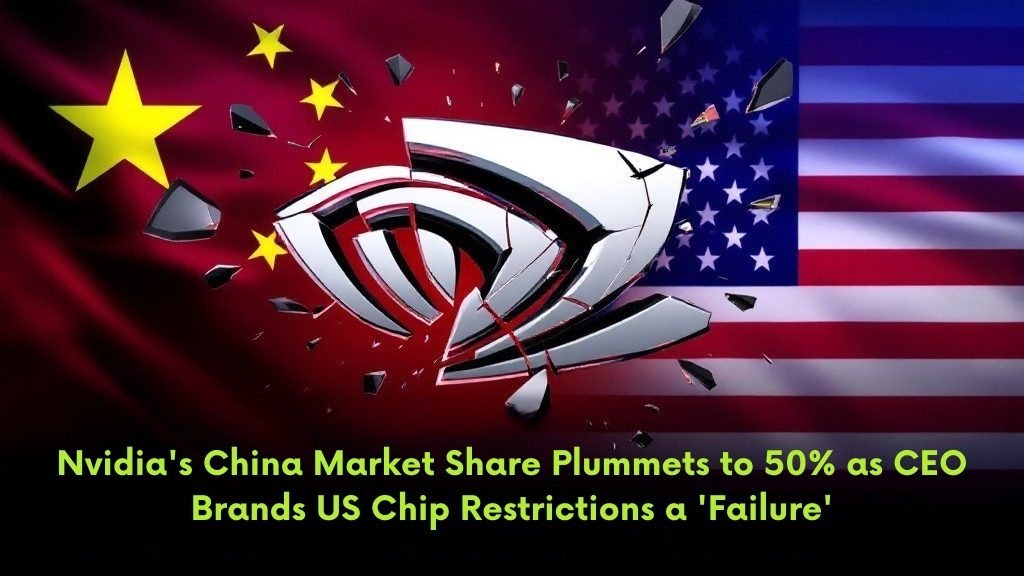Nvidia Corporation has witnessed its market share in China plummet from 95% to 50% following US semiconductor export restrictions, prompting chief executive Jensen Huang to denounce the measures as a complete failure that inadvertently accelerates Chinese technological development.
The dramatic decline represents one of the most significant market share losses in the semiconductor industry’s recent history. The drop underscores the profound impact of geopolitical tensions on global technology companies operating between the world’s two largest economies.
Huang’s criticism of the US chip restrictions reflects mounting frustration within American technology firms facing the consequences of trade policy decisions. The Nvidia chief executive argued that the export controls have produced unintended consequences by spurring Chinese companies to accelerate their domestic semiconductor development programmes.
The US government implemented the export restrictions to limit China’s access to advanced semiconductor technologies critical for artificial intelligence and quantum computing applications. These measures specifically target high-performance chips that could enhance China’s military capabilities and technological competitiveness in strategic sectors.
Beyond Nvidia, the restrictions have affected other major semiconductor companies including AMD, creating widespread disruption across the industry. The export controls have resulted in substantial financial charges for Nvidia, with analysts warning that continued restrictions could further erode the company’s position in one of the world’s largest technology markets.
The semiconductor export controls have created a paradoxical situation where measures intended to slow Chinese technological advancement may actually be accelerating it. Chinese companies, previously reliant on American semiconductor technology, are now investing heavily in domestic alternatives to reduce their dependence on foreign suppliers.
This shift towards self-reliance represents a fundamental change in the global semiconductor landscape. Chinese firms are channelling resources into research and development programmes designed to replicate and potentially surpass Western chip technologies, potentially creating formidable competitors for established American companies.
The broader implications extend beyond individual companies to encompass the entire structure of global technology supply chains. American semiconductor firms face the prospect of permanent exclusion from the Chinese market if domestic alternatives prove successful, whilst Chinese companies gain incentives to develop indigenous capabilities.
Industry observers note that the current trajectory could lead to the bifurcation of global semiconductor markets, with distinct American and Chinese technology ecosystems operating independently. Such fragmentation would fundamentally alter competitive dynamics and potentially slow global technological progress through reduced collaboration.
Despite recent tariff reductions between Washington and Beijing, the core semiconductor restrictions remain unchanged. These trade policy adjustments offer limited relief to companies like Nvidia, as they fail to address the fundamental export control framework governing advanced chip technologies.
The ongoing situation highlights the complex relationship between national security considerations and commercial interests. Whilst policymakers argue that semiconductor restrictions protect American technological advantages, industry leaders contend that such measures ultimately undermine their competitive positions.
Market analysts continue monitoring developments closely, as the semiconductor industry serves as a bellwether for broader US-China technological competition. The sector’s evolution will likely influence policy decisions affecting other strategic technologies including telecommunications, aerospace, and biotechnology.
The uncertain future of global technology markets reflects the deeper geopolitical rivalry between the United States and China. As both nations prioritise technological sovereignty, multinational corporations face increasingly difficult decisions about market participation and strategic positioning in an fragmenting global economy.
Citation: News Source: https://www.cnbc.com/2025/05/21/nvidia-ceo-jensen-huang-slams-us-chip-restrictions-as-a-failure.html









